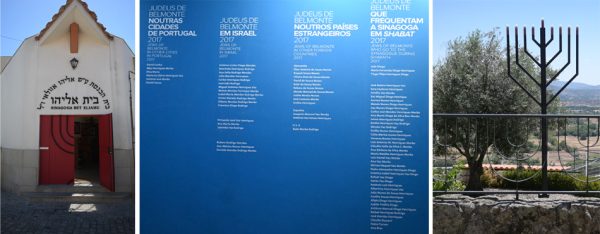By Doron Krakow
Belmonte: Tragedy or Triumph
This past Sunday my family returned from a vacation in Portugal. With a son and daughter-in-law in Israel and the rest of us in the New York area, a midpoint seemed like a good idea. Portugal is a country of some 10 million people at the westernmost tip of continental Europe—with a long Atlantic coastline. At one time the center of a global empire with colonies across both hemispheres, Portugal today is a modest member of the European Union, a liberal democracy that threw off the yoke of dictatorship in the 1970s. An ally of Great Britain in the Great War, it sat out World War II, maintaining its neutrality as its fascist-leaning head of state maintained ties with both the Allies and the Axis.
Lisbon, the capital city, was a haven for fleeing heads of state and members of royal families driven out of countries overrun by Germany and its allies. It was a hive of intelligence operatives of every description, and following the fall of France in June 1940, the city was home to the headquarters of the American Jewish Joint Distribution Committee (JDC or The Joint), which played a critical part in the rescue of Jews from all over Europe throughout the Nazi onslaught.
At the start of World War II, Portugal had few Jews, having driven them from the country more than four centuries earlier, when, in 1536, it adopted an inquisition modeled on that of Spain, its neighbor to the east. Many of the Jews in Portugal at that time converted to Christianity rather than face exile or death. Some among the converted became crypto-Jews, continuing, secretly, to maintain their devotion to Jewish tradition and practice. Once discovered, crypto-Jews were subject to severe and often horrific penalties and held accountable for the ills of the world. A pogrom in response to a prolonged drought saw thousands of suspected crypto-Jews slaughtered.
Like other places in Europe, Portugal’s Jewish story is a dark one, but there are a few points of light. One, in particular, is the story of the Jews of Belmonte, an agricultural village of about 6,000 people in the interior of the country, a three-hour drive from Lisbon. There, a community of 45 people (approximately 25 family units) live Orthodox Jewish lives. A relatively new and charming synagogue sits on a hillside on the village’s southern edge, and not far from a castle once occupied by the village nobleman and his family is a Jewish museum that tells the unique tale of Jewish Belmonte.

It is the story of crypto-Jews who went underground at the time of the inquisition. Though known to some of their neighbors, they were tolerated as long as they practiced in total secrecy and bore themselves as Christians in public. Candles lit to mark the arrival of Shabbat were then hidden behind closed cabinet doors. Overt Christian acts and practices shrouded Jewish holiday celebrations, and weddings took place only within the small, secretive community. The crypto-Jews lived like this for nearly 500 years, believing they could be the only Jews left. When a traveler from a far-off Jewish community stumbled upon them, he uttered the words of the Sh’ma to convince them that he, too, was Jewish and they were not alone.
In the 1980s, these crypto-Jews—about 120 individuals in all—emerged from hiding. Largely in-bred, many suffered from a host of genetic disorders, and their long-hidden practices, differed from those that over the centuries, had continued to evolve across the Jewish world. In the years since, the Jews of Belmonte who chose to remain have renewed their commitment to traditional practices and an Orthodox lifestyle. The majority, however, particularly the young people, have left and gone to Israel.
On a wall of the museum’s galleries, the names of Belmonte’s Jews (as of 2017) are arrayed in two lists—one displays those living in the community and the other, those who left. Together, the names form a comprehensive census of a singular Jewish community, including a close-knit group of families who risked everything to stay true to who they were, where they came from, and their steadfast commitment to one another—no matter the cost.
It has been nearly two weeks since we were in Belmonte, and I haven’t stopped thinking about these remarkable people. Sadly, there appears to be no future for them, as it’s mostly older members of the community who remain, and there is little expectation that Jews from elsewhere are likely to join them. In time, Belmonte may become yet another stop on a tour of places Jews once lived. The prospect of one more “end” for Jews strikes me as tragic.
But there’s another side to this story.
Their heroic determination to remain who they were made it possible for a tiny remnant of a once great Jewish community to survive, in secret, for half a millennium. Today, a majority have rejoined the Jewish people as citizens of the modern State of Israel, adding their unique history and DNA to the melting pot of Israeli society. How can we see their experiences and their story as anything but a triumph?
It is hard not to think about how luxurious our own lives are by comparison. Across North America we enjoy freedom to be who we wish to be and can access every conceivable resource to make choices—for ourselves and our communities about the kind of Jewish lives we want to live. No real risk. No concern that options will disappear. It’s Jewish life—however we wish to live it. But we are no less responsible for the Jewish future than the Jews of Belmonte. With an eye on the generations to come, what will our choices be?
Shabbat shalom.

Doron Krakow
President and CEO
JCC Association of North America
Reader Interactions